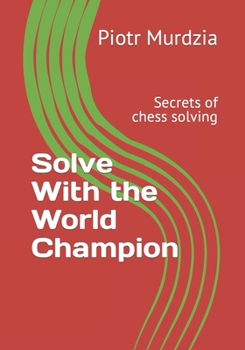Solve With the World Champion: Secrets of chess solving
In the first part of this book, the Polish solver Piotr Murdzia, a regular guest on the podium of world and European chess solving championships, world champion as many as 8 times, recounts his journey towards the top of excellence in his discipline. It is a story rich in teachings, full of outstanding characters, made of a lot of individual and collective work, love for what one does, determination and will to win, and above all positive thinking. As the author says: "I would like to add that effectiveness in problem solving is significantly influenced by a positive attitude and faith in one's own strength. Discouragement and resignation divert the solver from the goal, as they create a mental block that is impossible to overcome." But nobody wins alone, that's another lesson that Piotr's story gives us. He mentions with affection and rich detail the contribution of each of the people who were important in his path towards the top. The way he expresses his recognition and affection for these people is touching. For example, 'It's impossible not to recall Wladek's tears when I won my first gold medal. Such moments are among the most beautiful in life." In the second part, Piotr shares with readers some of his secrets in the discipline of solving chess problems, developped in decades of experience in competitions. He thoroughly analyses dozens of examples, showing especially how the composer's observance of the canons of the art of composition leave its marks, its signs on the composed problems, which are clues to their solution.Thus, understanding and appreciating the chess problem as an artistic composition makes easier the solving process. The reader who attentively follows Piotr's analyses and advice and tries to solve on his own the hundreds of exercises he proposes to consolidate learning, will have taken a safe step, both to better understanding and appreciating the difficulties and beauty of the art of composition, as well as to being an effective competitor in solving contests. Half a century ago, the brilliant Ukrainian chess grandmaster David Bronstein coauthored, with Georgii Smolian, a little-known but very thought-provoking book: "Chess in the eighties". In it, Bronstein makes some speculations about chess in the future. He predicts that one day the grandmasters will be released from fighting hard against bitter opponents and the cruel control of time, and will act as lecturers, solving problems for an attentive audience, demonstrating how they arrived at the solution. And the audience will be able to appreciate "how beautifully" their idols think. The future foreseen by Bronstein has not yet arrived, but I think that, by reading this book, readers will be able to appreciate the finesse of the thoughts of a great chessboard champion, see how he can see shortcuts in the most complicated positions, rationalize the immense complexities of chess by some simple principles. Alekhine complained about chess books: masters need to say, honestly, what they really saw. The author of this book does not keep his secrets, he reveals them. He tells us what he saw, what he thought. Thus, he offers us a unique book.
Format:Paperback
Language:English
ISBN:B0CGG8GQ4L
ISBN13:9798388207722
Release Date:August 2023
Publisher:Independently Published
Length:238 Pages
Weight:0.92 lbs.
Dimensions:0.5" x 7.0" x 10.0"
Related Subjects
GamesCustomer Reviews
0 customer rating | 0 review
There are currently no reviews. Be the first to review this work.





















